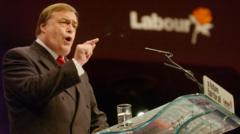
John Prescott was a pivotal figure in the New Labour movement, serving as a crucial bridge between traditional Labour values and the party’s modernization under Tony Blair. Born in Prestatyn, Wales in 1938, Prescott came from a working-class background, initially working as a ship’s steward and becoming active in the National Union of Seamen.
After studying economics and politics, Prescott was elected as MP for Hull East in 1970. He quickly became a prominent Labour frontbencher, known for his passionate and sometimes pugnacious style. During the 1980s and 1990s, he played a critical role in transforming the Labour Party, helping to modernize its approach while maintaining its core working-class roots.
As deputy prime minister for 10 years, Prescott held significant responsibilities, particularly in transport and environment portfolios. He pledged to create an integrated transport system and was part of the team that secured three consecutive election victories. However, his tenure was not without controversy. He became known as “Two Jags” after being criticized for using his ministerial car for short journeys and owning multiple vehicles.
Prescott’s political career was marked by both notable achievements and personal scandals. In 2006, he admitted to an affair with his secretary, which led to significant media scrutiny. Despite these challenges, he remained a loyal Labour Party member, supporting various leaders including Jeremy Corbyn, despite their ideological differences.
Throughout his career, Prescott was known for his colorful personality and memorable moments. During the 2001 election, he famously punched a protester who had thrown an egg at him, an incident that surprisingly garnered public support. He often injected humor into difficult political situations and was recognized for his ability to communicate with working-class voters.
After stepping down as deputy prime minister, Prescott surprisingly accepted a peerage in 2010, despite previously stating he would not do so. He used his position in the House of Lords to continue campaigning on environmental issues and remained politically active.
His political philosophy centered on delivering “traditional values in a modern setting,” and he saw himself as a guard keeping the Labour train on its tracks. Despite being somewhat of an outsider among the “beautiful people” of New Labour, he was instrumental in the party’s transformation and electoral success.
Prescott’s career spanned over 50 years, ending when he was removed from the House of Lords for non-attendance in 2023. To the end, he remained a unique political figure – a trades union-bred politician who believed in marrying political principles with the practical pursuit of power.
His legacy is that of a crucial transitional figure who helped modernize the Labour Party while maintaining its core working-class identity, bridging traditional socialist values with the pragmatic approach of New Labour.







